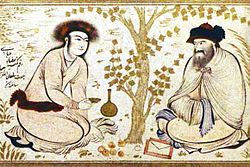Nazar ila'l-murd: Difference between revisions
m rv -- pederasty, not pedophilia |
Touching up underage boys is pedophilia however you sickos try to word it. Wikipedia is being used as a propaganda launching pad for pedophiles. |
||
| Line 18: | Line 18: | ||
Conservative Islamic theologians condemned the custom of contemplating the beauty of young boys. Their suspicions may have been justified, as some [[dervish]]es boasted of enjoying far more than "glances", or even kisses. Nazar was denounced as rank [[heresy]] by such as [[Ibn Taymiyya]] ([[1263]]-[[1328]]), who complained, "They kiss a slave boy and claim to have seen God!" The real danger to conventional religion, as [[Peter Lamborn Wilson]] asserts, was not so much the mixing of sodomy with worship, but "the claim that human beings can realize themselves in love more perfectly than in religious practices." Despite opposition from the clerics, the practice has survived in Islamic countries until only recent years, according to Murray and Roscoe in their work on Islamic homosexualities. |
Conservative Islamic theologians condemned the custom of contemplating the beauty of young boys. Their suspicions may have been justified, as some [[dervish]]es boasted of enjoying far more than "glances", or even kisses. Nazar was denounced as rank [[heresy]] by such as [[Ibn Taymiyya]] ([[1263]]-[[1328]]), who complained, "They kiss a slave boy and claim to have seen God!" The real danger to conventional religion, as [[Peter Lamborn Wilson]] asserts, was not so much the mixing of sodomy with worship, but "the claim that human beings can realize themselves in love more perfectly than in religious practices." Despite opposition from the clerics, the practice has survived in Islamic countries until only recent years, according to Murray and Roscoe in their work on Islamic homosexualities. |
||
[[Category: |
[[Category:Pedophilia]] |
||
Revision as of 13:58, 14 January 2006

Reza Abbasi, ca. 1625; Isfahan, Iran;
Metropolitan Museum of Art, New York.

Miniature illustration from the Haft Awrang of Jami, in the story A Father Advises his Son About Love. Freer and Sackler Galleries, The Smithsonian Institution, Washington, DC.
As a Sufi practice of spiritual realization and union with the godhead, the meditation known in Arabic as Nazar ill'al-murd, "contemplation of the beardless," or Shahed-bazi, "witness play" in Persian has been practiced from the earliest years of Islam. It is seen as an act of worship intended to help one ascend to the absolute beauty that is God through the relative beauty that is a boy. Modern Sufi thought asserts that this contemplation uses imaginal yoga to transmute erotic desire into spiritual consciousness.
In an illuminated manuscript of Sufi poet Abdul-Rahman Jami's (1414-1492) Haft Awrang (see manuscript), an anthology of seven alegorical poems on wisdom and love, there is a calligraphed verse in the section titled A Father Advises his Son About Love (in which a father instructs his son, when choosing a worthy male lover, to chose that man who sees beyond the mere physical and expresses a love for his inner qualities). The verse exemplifies one Sufi way of turning love into wisdom:
- I have written on the wall and door of every house
- About the grief of my love for you.
- That you might pass by one day
- And read the state of my condition.
- In my heart I had his face before me.
- With this face before me, I saw what I had in my heart.
Nazar was a principal expression of a male love that, according to the teachings, was not to be consummated physically.
Not all followed the teachings strictly to the letter. On being challenged by Rabi’a al-‘Adawiyya (c.717-801) of Basrah (Sufi woman saint who first set forth the doctrine of mystical love), upon noticing him kissing a boy, for appreciating the beauty of boys above that of God, the ascetic Sufi Rabah al-Qaysi retorted that, "On the contrary, this is a mercy that God Most High has put into the hearts of his slaves."
Conservative Islamic theologians condemned the custom of contemplating the beauty of young boys. Their suspicions may have been justified, as some dervishes boasted of enjoying far more than "glances", or even kisses. Nazar was denounced as rank heresy by such as Ibn Taymiyya (1263-1328), who complained, "They kiss a slave boy and claim to have seen God!" The real danger to conventional religion, as Peter Lamborn Wilson asserts, was not so much the mixing of sodomy with worship, but "the claim that human beings can realize themselves in love more perfectly than in religious practices." Despite opposition from the clerics, the practice has survived in Islamic countries until only recent years, according to Murray and Roscoe in their work on Islamic homosexualities.
